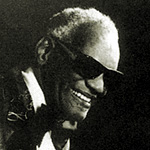Ray Charles, whose musical genius is celebrated this evening as he receives the Songwriters’ Hall of Fame1993 Lifetime Achievement Award, has, in the course of his 47 years as a professional musician, become a musical legend, one of the outstanding Figures to play a key role in the musical history of the latter half of the 20th century.
And not a thing (save his extraordinary talent) was given to him, as he set out poor, blind and black, a son of the poverty-stricken, segregated rural South.
From the humblest of beginnings, Ray Charles (born in Albany, Georgia on September 23, 1950) is now honored by a Star on Hollywood Boulevard’s renowned Walk of Fame, and among a multitude of achievements, his rendition of “America the Beautiful,” perceived by many as our “second national anthem” has enhanced his image.
While many artists of his stature tend to take on an “elder statesman” kind of presence, Ray Charles simply goes on and on, making recordings (his latest is titled “My World,” on Warner Bros. Records) and more friends wherever he performs live.
Ray Charles Robinson, at age three months, during the height of the great Depression, moved with his parents across the border from Albany, GA, to the town of Greenville, Florida. When he was seven, the youngster lost his sight and later qualified for a charity scholarship to attend the Florida Sate School for the Deaf and Blind in St. Augustine.
Here, he learned Braille and typing and also became a skilled basket weaver.
He was also given the opportunity to develop his interest in music into a
legitimate skill. He became intrigued by mathematics and its correlation to music. He learned to compose and arrange music in his head, telling out the parts, one by one. When his mother died during his late teen years, he left St. Augustine to take to the road and the long quest for musical acceptance and stardom began in earnest.
Years of dues-paying, the price most successful musicians have to pay, followed for the teenager. While some successes were achieved in Florida, bigger moves began to take shape when a friend pointed him to the “farthest point in the continental U.S. from Florida,” Seattle, Washington, and upon arrival there,
he soon became a minor celebrity in local clubs.
From Seattle, it was an easy jump southward to Los Angeles, where the now Ray Charles (he dropped his last name, Robinson, in deference to “Sugar” Ray Robinson) cut his first professional recording. Somewhat later, he had his first major hit, “I Gotta Woman,” In the years to follow, record hits came, one
after the other as he achieved national, and then international fame.
Along the way, Ray Charles became extremely adept at bringing his rhythm and blues and his jazz stylings into the broad pop mainstream, a unique gift which many performers spend a lifetime not achieving. Ray Charles has enjoyed major acceptance in the country music field as well. An outstanding example of this was his long-lasting hit recording of “Georgia on My Mind,” which, in 1979, was approved as the official song of The State of Georgia, with Ray Charles singing his version on the floor of the State Capital.
In January 1986, Charles was one of the original group of inductees in The Rock and Roll Hall of Fame, and he has also been inducted into the Rhythm and Blues and The Playboy Jazz Halls of Fame. Five years ago, he received the Lifetime Achievement Award from the National Academy of Recording Arts and
Sciences, with the presentation made on the 1988 Grammy Awards Show on CBS-TV.
In December 1986, Charles was one of the recipients of the Kennedy Center Honors. He has twice been honored by the government of France, most recently becoming a Commander of Fine Arts and Letters of the French Republic. Among his many performances for U.S. Presidents and foreign heads of state was
his recent participation in the inaugural festivities honoring President Clinton. Additionally, the past few years have increased his exposure to the American public with his award winning series of commercials for Diet Pepsi. “I’ll keep making my music as long as there’s anyone who wants to hear me,” he explains, as he sets about getting ready for another half century of supreme music making.


